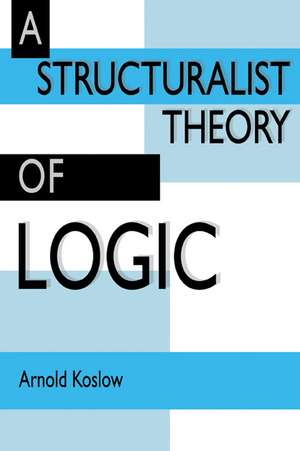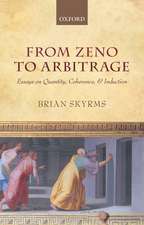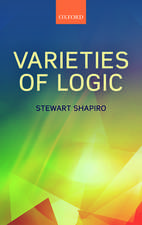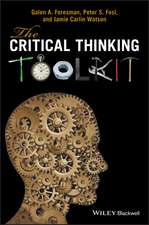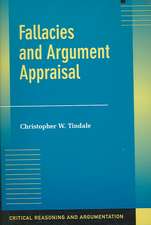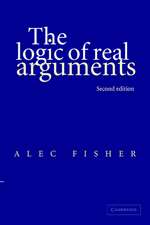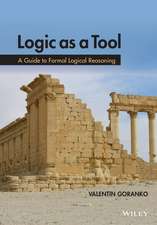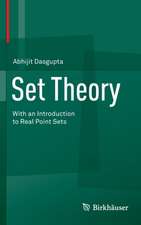A Structuralist Theory of Logic
Autor Arnold Koslowen Limba Engleză Paperback – 16 noi 2005
| Toate formatele și edițiile | Preț | Express |
|---|---|---|
| Paperback (1) | 503.08 lei 6-8 săpt. | |
| Cambridge University Press – 16 noi 2005 | 503.08 lei 6-8 săpt. | |
| Hardback (1) | 756.75 lei 6-8 săpt. | |
| Cambridge University Press – 26 mar 1992 | 756.75 lei 6-8 săpt. |
Preț: 503.08 lei
Preț vechi: 565.26 lei
-11% Nou
Puncte Express: 755
Preț estimativ în valută:
96.27€ • 102.94$ • 80.26£
96.27€ • 102.94$ • 80.26£
Carte tipărită la comandă
Livrare economică 17 aprilie-01 mai
Preluare comenzi: 021 569.72.76
Specificații
ISBN-13: 9780521023726
ISBN-10: 0521023726
Pagini: 436
Ilustrații: 15 b/w illus.
Dimensiuni: 157 x 203 x 30 mm
Greutate: 0.64 kg
Editura: Cambridge University Press
Colecția Cambridge University Press
Locul publicării:New York, United States
ISBN-10: 0521023726
Pagini: 436
Ilustrații: 15 b/w illus.
Dimensiuni: 157 x 203 x 30 mm
Greutate: 0.64 kg
Editura: Cambridge University Press
Colecția Cambridge University Press
Locul publicării:New York, United States
Cuprins
Preface; Part I. Background: 1. Introduciton; 2. The program and its roots; 3. Introduction and elimination conditions in a general setting; 4. The Belnap program; Part II. Implication Relations: 5. The theory of implication relations; 6. Implications: variations and emendations; 7. Familiar implication relations: deducibility and logical consequence; 8. Implication relations: direct and derived; 9. Implications from implications; 10. Implication relations and the a priori: a further condition?; Part III. The Logical Operators: 11. Hypotheticals; 12. Negations; 13. Conjunctions; 14. The disjunction operator; 15. The logical operators parameterized; 16. Further features of the operators; 17. The dual of negation: classical and nonclassical implication structures; 18. The distinctness and relative power of the logical operators; 19. Extensionality; 20. Quantification; 21. Identity; 22. Special structures I. logical operators on individuals: mereology reconstituted; 23. Special structures II. interrogatives and implication relations; 24. Completeness; Part IV. The Modal Operators: 25. Introduction; 26. Modality; 27. Modals: existence and nonextensionality; 28. Special modals; 29. The possibility of necessity-style modals; 30. Modals revisited I; 31. Quantification and modality; 32. Modals revisited II; 33. Knowledge, truth, and modality; 34. The comparative strength of modals; 35. Kripke-style systematization of the modals without possible worlds; 36. Model functions, accessibility relations, and theories; 37. Migrant modals; Appendix; Notes; Bibliography; Index.
Recenzii
"...a novel and comprehensive logical theory....The beauty of this book is that it develops a mathematically rigorous and intuitively appealing vision using only the most elementary technical tools....[an] extraordinary book. Given the coherence, conceptual power, and novelty of the theory it presents, it ought to become a classic." GLH--Philosophy Review
"In short, this volume has the makings of a classic. I have rarely found myself so enthusiastic about a recent book in logic. I recommend it in the strongest terms." Isaac Levi, Columbia University
"Koslow's theory permits us to identify logical operators independent of their form in both logical systems and in natural languages. For linguists, his theory opens up the possibility of an entirely new approach to the study of natural-language semantics, one which does not require the postulation of a level of logical form." D. Terence Langendoen, University of Arizona
"In short, this volume has the makings of a classic. I have rarely found myself so enthusiastic about a recent book in logic. I recommend it in the strongest terms." Isaac Levi, Columbia University
"Koslow's theory permits us to identify logical operators independent of their form in both logical systems and in natural languages. For linguists, his theory opens up the possibility of an entirely new approach to the study of natural-language semantics, one which does not require the postulation of a level of logical form." D. Terence Langendoen, University of Arizona
Descriere
In this 2001 book, Professor Koslow advances a new account of the basic concepts of logic.
